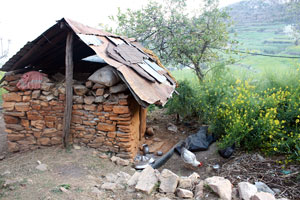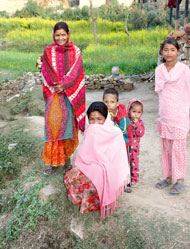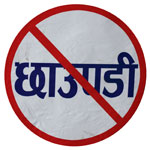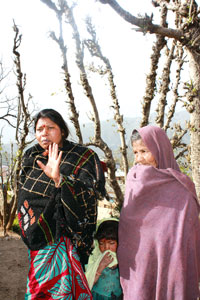 PICS: RUBEENA D SHRESTHA |
The tradition of 'chaupadi' stems from ignorance and superstition, and requires married women to be banished to the cowshed for four days and unmarried women for seven days every month during their periods. Mothers and their newborn babies, too, have to go to the cowshed.
Ousted from their homes, the women have little access to clean water, face dangers from snakes and wild animals attracted by the scent of blood, are prone to physical assault, violence and even rape. Living in such unhygienic conditions exposes them to infections and disease.
The narrow, squat little outhouses are dank and windowless. If a family doesn't have a chaupadi shed, neighbourhood women share a common cowshed sometimes with up to 15 women packed like sardines inside.
 EXCOMMUNICATED: Such is the hold of tradition and superstition that Achham women still willingly banish themselves to outhouses during their monthly periods. |
Considering a woman to be unclean when she is on her periods is not limited to Achham, it is endemic among many Hindu families in Nepal, and even educated and wealthy women aren't allowed to enter the kitchen, visit temples or touch male members of the family.
"To end chaupadi, women need a secure environment. But till there is a change of belief, till menstruation is not considered to be a normal, natural, biological phenomenon, this practice is going to continue," says women's rights activist, Manju Thapa.
This is starting to happen. In the district capital Mangalsen many women have stopped going to sheds once a month not because of awareness, but due to growing affluence from remittances. More money means better houses with more rooms, and so there is space inside the house for that time of the month.
"Now some families have enough money to build separate rooms so the female folk do not have to go to the goth, the biggest problem is still poverty," says Ambika Chalaune, a young local politician.
 |
"If I can feed the cow when having my periods, why can't I drink its milk? If I can collect firewood for the kitchen, why can't I cook? If I touch a plant, it will die they say, then why am allowed to breast-feed in the chaupadi?" asks Chalaune.
Growing literacy is spreading awareness, but old traditions die hard. Chaupadi has become one of those easy buzzwords for NGOs to conduct awareness programs, and distribute allowances to participants. But local activists say many women who are 'made aware' go back to being banished to their sheds every month.
"I will not risk it" 
Radha Nepali Pariyar is a single mother who has come back to live at her father's house ever since her husband abandoned her for a younger woman. She had just returned from a day breaking stones and working in the fields. Her father's house is among the better ones in the village and the shed lies in his property. She shows us the separate utensils which she has to use during her periods.
"My father works as a guard at the bank and has a steady income. He built this nice new house with many rooms and welcomed my son and me back," she tells us, "he is also a Christian and does not believe in chaupadi anymore and tells me to stay in the house itself. But I cannot. What if I touch something and something bad happens? Who will take responsibility? I will not risk it."
The group of women who have gathered around all nod and agree with Radha.
Read also:
We still want to live, NARESH NEWAR in DAILEKH
The government spent $20 million in 2010 for HIV response, but not much of it got to the village of Rakam
See also:
Custom-made injustice, ARUNA UPRETI
Will we finally have a law that makes solitary confinement of Nepali women illegal?


